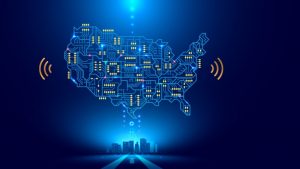The Biden administration is proposing that the Federal government take a giant leap into the national broadband service market – traditionally the province of the private sector – in order to close persistent service availability and affordability gaps across the United States.
A bipartisan group of House legislators urged internet service providers (ISPs) and trade associations to participate in and help make consumers aware of the newly created $3.2 billion Emergency Broadband Benefit (EBB) Program.
The demand for reliable and affordable broadband service has skyrocketed in the last year as Americans began relying on the internet for telework, distancing learning, and telehealth during the COVID-19 pandemic. However, many Americans – both urban and rural – have lacked either access or sufficient connection strength during the health crisis.
As the state has shifted to distanced and hybrid learning during the COVID-19 pandemic, the New Jersey Department of Education announced it has closed the K-12 digital divide by using roughly $60 million in Federal funding.
Sens. Susan Collins, R-Maine, and Jacky Rosen, D-Nev., are introducing legislation that will provide up to $15 billion in matching grants to increase access to broadband services in areas of the United States that are unserved by broadband meeting the Federal Communications Commission (FCC) minimum definition of that service.
A bipartisan group of senators from the Senate Committee on Commerce, Science, and Transportation has reintroduced the Telecommunications Skilled Workforce Act, a bill to address the shortage of trained telecom workers.
Arkansas Governor Asa Hutchinson released the Arkansas State Broadband Map, an interactive tool that allows Arkansans to find broadband providers in their neighborhood and assists state agencies in developing broadband policy.
Reps. Frank Lucas, R-Okla., and Eddie Bernice Johnson, D-Texas, released a new bill that aims to improve science, technology, engineering, math, and computer science (STEM) education in rural communities.
After months with no movement and a weekend full of deal-making, Congress is expected to pass a $900 billion COVID-19 relief package as part of a broader Fiscal Year 2021 (FY21) omnibus spending bill. The relief includes a new round of Payment Protection Program (PPP) funding, money for broadband deployment and emergency use, and money to remove banned Huawei and ZTE equipment.
The Senate Committee on Commerce, Science, and Transportation signed off on three broadband bills during a Nov. 18 business meeting.










